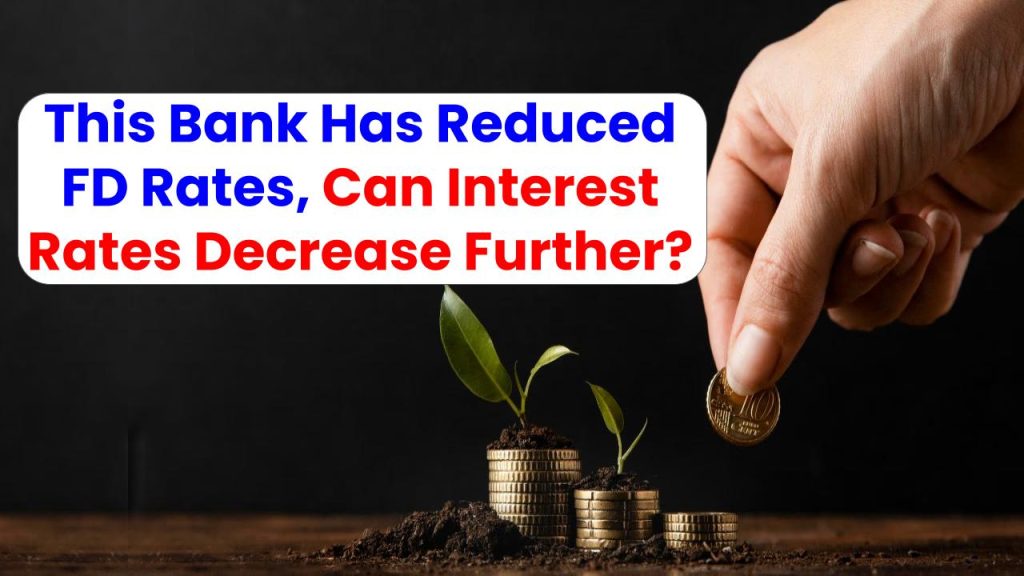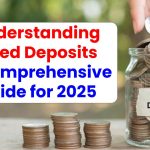
If you’ve been planning to invest in a fixed deposit (FD), now might be the time to act. Starting April 2025, several major banks in India, including HDFC Bank and Yes Bank, have announced a reduction in FD interest rates, leaving many investors wondering: Will FD interest rates fall even more in the coming months?
Let’s dive deep into this topic, explore why banks are cutting interest rates, how it could affect your returns, and what you can do to make the smartest decision with your money.
Bank Has Reduced FD Rates
| Topic | Details |
|---|---|
| Recent Rate Cuts | HDFC Bank cut FD rates by 35-40 bps; Yes Bank by 25 bps on some tenures |
| Current Highest FD Rates | Up to 7.75% (Yes Bank for senior citizens); 7.10% (HDFC Bank general) |
| RBI Repo Rate | Reduced to 6.25% in February 2025, may fall further in April 2025 |
| Reason for Cuts | RBI’s move to boost economic growth via monetary policy easing |
| What’s Next | Analysts predict another 25 bps repo cut in the next MPC meeting |
| Expert Tip | Lock in current FD rates now to avoid lower returns later |
In April 2025, FD interest rates are falling, and major banks like HDFC Bank and Yes Bank have already reduced their rates. With the RBI likely to cut repo rates again, investors must act smartly. If you’re planning to invest in FDs, it’s a good time to lock in current rates, explore government-backed alternatives, and diversify your portfolio to ensure stable, tax-efficient returns in the long run.
HDFC, Yes Bank Cut FD Rates: What Changed?
India’s largest private lender, HDFC Bank, has reduced its FD interest rates by up to 40 basis points (bps) starting April 1, 2025. According to the bank’s latest update, FDs with tenures of 35 and 55 months will now earn lower returns:
- 35-month FD: Now offers 7.00%, down from 7.35%
- 55-month FD: Now offers 7.10%, down from 7.50%
Similarly, Yes Bank has slashed its FD interest rates by 25 bps for select tenures, impacting both retail and senior citizen investors. The new rates range from 3.25% to 7.75%, depending on the investment period.
These reductions signal the start of a broader trend where banks may continue to slash deposit rates in response to RBI’s policy stance.
see also: If You Deposit ₹30,000 Every Year, You Will Get ₹8,13,642
Why Are FD Rates Dropping in April 2025?
The Reserve Bank of India (RBI) cut the repo rate by 25 bps to 6.25% in February 2025 to support growth and manage inflation. With inflation cooling and global economic uncertainty on the rise, RBI’s move is part of its accommodative policy strategy.
What Is the Repo Rate?
The repo rate is the interest rate at which RBI lends money to commercial banks. When the repo rate drops:
- Loans become cheaper
- Deposit interest rates also fall
This creates liquidity in the economy but hurts savers who rely on FDs for steady income.
Will FD Rates Fall Further?
Most likely, yes.
According to a Reuters poll and economists from ICICI Securities, there’s a strong expectation that RBI will cut the repo rate again by another 25 basis points during the Monetary Policy Committee (MPC) meeting in April 2025.
That would push FD rates even lower, especially for long-term tenures.
What Should FD Investors Do Now?
If you’re wondering whether to wait or invest now, here’s some practical advice:
Lock in Higher Rates Now
Invest in FDs before more rate cuts kick in. Banks still offer special FD schemes with relatively higher interest rates for a limited time.
Look for Senior Citizen Schemes
Many banks offer extra interest (0.50% more) to senior citizens. For example:
- SBI Senior Citizen FD: Up to 7.50%
- ICICI Bank Golden Years FD: Up to 7.60%
Use Laddering Strategy
Don’t put all your money in one FD. Split it across multiple tenures:
- 1 year
- 2 years
- 3 years
This helps you manage liquidity and interest rate fluctuations.
Top FD Rates as of April 2025
| Bank | General Citizen (Max) | Senior Citizen (Max) |
|---|---|---|
| Yes Bank | 7.50% | 7.75% |
| HDFC Bank | 7.10% | 7.60% |
| SBI | 7.00% | 7.50% |
| ICICI Bank | 7.10% | 7.60% |
| Axis Bank | 7.00% | 7.50% |
What Happens If FD Rates Keep Falling?
1. Lower Returns on Savings
If you depend on FD interest for monthly income, your payouts will reduce, especially for long tenures.
2. More Tax Burden
Interest earned on FDs is fully taxable under ‘Income from Other Sources’. So, lower returns mean even less post-tax income.
3. Shift to Alternatives
Investors may start exploring:
- RBI Floating Rate Bonds (7.13%)
- Post Office Schemes (up to 7.7%)
- Short-term debt mutual funds
Alternatives to Fixed Deposits in 2025
| Investment Option | Interest/Return Rate | Risk Level |
|---|---|---|
| RBI Floating Rate Bond | 7.13% (linked to NSC) | Low |
| Senior Citizen Savings Scheme (SCSS) | 8.2% | Very Low (Govt) |
| Post Office Monthly Income Scheme | 7.4% | Low (Govt-backed) |
| Debt Mutual Funds | 6-8% (market linked) | Moderate |
| Tax-Free Bonds | ~5.8% (long term) | Low to moderate |
Expert Insight: Should You Be Worried?
Not necessarily.
FDs are still one of the safest options for capital protection, especially for senior citizens and risk-averse investors. But it’s wise to:
- Reassess your risk appetite
- Diversify into safe alternatives
- Don’t chase unrealistic returns or shady “high interest” offers
Pro Tip: Review your FD portfolio every 6 months, especially during a rate cut cycle.
see also: How Much Return Will You Get on TD, MIS, RD, PPF, FD?
FD Rates FAQs
1. Why are FD interest rates being reduced now?
FD rates are being cut because RBI has lowered the repo rate to encourage growth. Banks respond by reducing both lending and deposit rates.
2. Will FD interest rates drop again in 2025?
Most likely yes. Experts expect another 25 bps cut in the RBI’s next policy meeting.
3. Is it still worth investing in FDs?
Yes, especially for senior citizens and conservative investors. But consider locking in longer-term FDs now before rates drop further.
4. Are there safer or better alternatives to FDs?
Yes. Consider SCSS, Post Office schemes, or RBI Bonds for better rates with government backing.
5. How is FD interest taxed?
FD interest is fully taxable. Banks also deduct TDS if the interest exceeds ₹40,000 (₹50,000 for seniors) annually.











